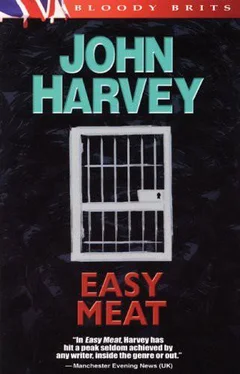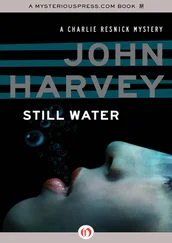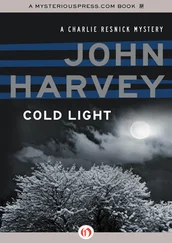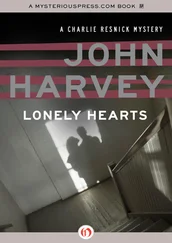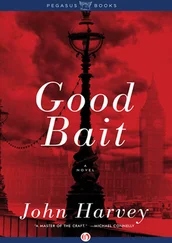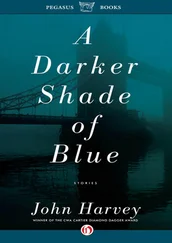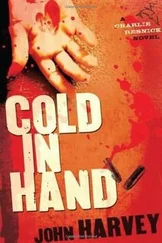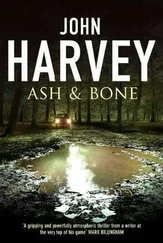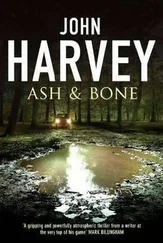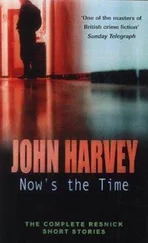John Harvey - Easy Meat
Здесь есть возможность читать онлайн «John Harvey - Easy Meat» весь текст электронной книги совершенно бесплатно (целиком полную версию без сокращений). В некоторых случаях можно слушать аудио, скачать через торрент в формате fb2 и присутствует краткое содержание. Год выпуска: 1996, ISBN: 1996, Издательство: Bloody Brits Press, Жанр: Полицейский детектив, на английском языке. Описание произведения, (предисловие) а так же отзывы посетителей доступны на портале библиотеки ЛибКат.
- Название:Easy Meat
- Автор:
- Издательство:Bloody Brits Press
- Жанр:
- Год:1996
- ISBN:9781932859591
- Рейтинг книги:4 / 5. Голосов: 1
-
Избранное:Добавить в избранное
- Отзывы:
-
Ваша оценка:
- 80
- 1
- 2
- 3
- 4
- 5
Easy Meat: краткое содержание, описание и аннотация
Предлагаем к чтению аннотацию, описание, краткое содержание или предисловие (зависит от того, что написал сам автор книги «Easy Meat»). Если вы не нашли необходимую информацию о книге — напишите в комментариях, мы постараемся отыскать её.
Easy Meat — читать онлайн бесплатно полную книгу (весь текст) целиком
Ниже представлен текст книги, разбитый по страницам. Система сохранения места последней прочитанной страницы, позволяет с удобством читать онлайн бесплатно книгу «Easy Meat», без необходимости каждый раз заново искать на чём Вы остановились. Поставьте закладку, и сможете в любой момент перейти на страницу, на которой закончили чтение.
Интервал:
Закладка:
Resnick’s house was a substantial detached property in Mapperley Park, a short distance to the northeast of the city center. Situated on the curve of a narrow crescent, a white stone wall and a small area of lawn separated it from the road. There was a passage at the side, wide enough to park the car which Resnick seldom used, and beyond that a ragged garden of grass and shrubs, a cherry tree that needed pruning and a shed in sore need of creosote and nails. The cherry tree was already shedding blossoms.
Almost immediately past the hedge at the garden’s foot, the land fell steeply away over the allotments of Hungerhill Gardens and the heart of the city was exposed. Between the railway station and Sneinton windmill, the floodlights of the two soccer grounds showed up clearly, perched on either side of the Trent. Terraced houses that had stood in stubby rows since the turn of the century shared the land with curves and courts of new development that was already starting to look careworn and old. Along the canal, warehouses with peeling fronts, home to flocks of graying pigeons if little else, stood beside architect-designed office buildings and the new marina, and a shopping park of superstores encouraging need and envy, good ambition and bad debts. From where he might stand, at an upstairs window or the garden’s edge, Resnick could not see the night shelters, the needles discarded below the old railway arch, the benches and shop doorways where the homeless slept, but he knew they were there.
The interior of the house was darker than it would have been, seen with someone else’s eyes, the furniture heavy and largely in need of replacement. On the ground floor, at the front, was the living room, comfortable and large, in which Resnick would sometimes sit late, listening to music, occasionally finding something that interested him on the TV. Past the middle room-a dumping ground for boxes and old magazines, whatever Resnick could not bear to throw away-was the kitchen, large enough to house a scrubbed dining-table, a miscellany of pots and pans, an antiquated stove, a refrigerator stuffed with packages from the deli, cat food, and bottled beer.
The stairs, broad, with carved wooden banisters, curved up from the center of the house towards Resnick’s bedroom, the bathroom, other rooms he rarely entered, were less often used. At the top of the house one room had been reduced to bare boards, layers of wallpaper stripped from the wails and not replaced. A man Resnick had been pursuing, a murderer, William Doria, had killed himself there, in front of Rachel Chaplin, a woman whom Resnick had thought, however briefly, he might have loved. Resnick had labored to remove the stains of blood from his sight, but that was all and not enough; they hung still in that room on the air, floated like feathers, pink-tinged and soft, that brushed his face and stirred his memory, would not let it rest.
Resnick rarely went there, climbed those stairs. He had tried moving once, thought of it many times, but somehow he had stayed. A family house, though he had no immediate family, unless you included the cats and he did not. Cats were cats and people people and Resnick knew the difference, he was clear on that. To all intents and purposes, he lived in just three rooms and let the rest succumb to dust.
When he arrived home that evening on foot, after buying Millington and the CID team a quick round in the pub, the black cat, Dizzy, was waiting for him, as usual, atop the length of wall. Automatically, Resnick reached out a hand to stroke the animal’s glossy fur, but Dizzy turned away from his touch and, tail raised, presented Resnick with a fine view of his backside as he ran along the wall and then sprang down towards the door, anxious to be fed. A neat encapsulation, Resnick thought, of man’s relationship with cats.
Inside, two of the others, Miles and Pepper, threaded themselves between his legs as he walked towards the kitchen, sifting through the mail he had picked up from the floor. Bud, the fourth and last, eternally young and stupid, lay wedged, for no apparent reason, midway through the cat door, mewing pathetically. Dropping straight into the bin the usual conglomeration of circulars and catalogs, advertisements for a double CD or cassette collection of Songs that Won the War , and invitations from his bank to come in and discuss his financial affairs, Resnick bent down and prized open the cat flap and Bud came sprawling through.
Fifteen minutes later, he had fed them, ground coffee, and set the kettle on to boil, improvised a sandwich from scraps of stilton, a few fading leaves of rocket, a rasher of cold, cooked bacon, and the last of a jar of mayonnaise. The Post had arrived, offering free tickets to Butlins, free flights to Spain, six hundred pounds’ worth of holiday vouchers and free beer. Pretty soon, Resnick thought, the entire population of the city would be off sunning itself and singing “Viva Españia!” and the crime figures would take care of themselves.
In the front room, he dropped into an easy chair and closed his eyes. When he opened them again the night was gathering close around the windows, the coffee was cold but still drinkable, and the sandwich-the sandwich tasted just fine. As he ate it he stared across the room at his recent acquisition, a brand-new CD player to complement his stereo; his nightly project, working through the tracks of the ten-disc Billie Holiday set he had bought himself the Christmas before last.
What would it be this evening?
“Some Other Spring”?
“Sometimes I’m Happy”?
“I Got It Bad (And That Ain’t Good)”?
When the call came through, he was listening to “Body and Soul,” the ’57 version with Harry Edison taking the bridge. Resnick recognized the slight catch in Kevin Naylor’s voice as the younger officer struggled to keep his emotions in check.
“Alive?” Resnick asked, frowning.
“Yes, sir. Last I heard. The old woman, though, got to be touch and go.”
“Anyone gone to the hospital?”
“Mark, sir.”
“Not Lynn?”
“Already out. Something to do with this kid as absconded.”
“Right. Call Graham, tell him to meet me at the house. And you, stay there till I arrive. And for Christ’s sake don’t let any bugger trample over everything.”
Without waiting to hear Naylor’s reply, Resnick set down the receiver and headed for the door. Near enough eleven thirty and it was going to be a long night. He found his car keys on the table in the hall and grabbed a topcoat from the hooks inside the door. Long and likely cold.
Unaware, though she was never really that, Billie Holiday sang on in the empty room.
Graham Millington, burly, hands in pocket, was pacing the pavement inside the area that had been cordoned off, firing an occasional scowl in the direction of those bystanders who were still lingering in the wake of the sirens’ call. Naylor stood in the doorway, face paler than usual in the fall of the street light, one of those faces that were forever young until the day that suddenly they were old.
Resnick parked at the opposite side of the street and strode across.
“Break-in, looks like,” Millington said, falling into step.
“Entry?”
“Round back. Shimmied in through the window.”
“How many?”
“Hard to say as yet. By sight of what’s in there, happen half a hundred of ’em.”
Resnick blinked. Something was pulsing away behind his left temple, some premonition of pain.
“I’ve this minute had a call from Mark,” Naylor said. “Woman’s in the operating theatre, crushed skull. Brain damage, sounds like. Serious.”
“And the husband?”
“Be okay, I think. Cuts and bruises. Shock.”
Resnick turned towards the street, faces indistinct between curtains pulled back. “Witnesses? Anyone seen running away?”
Читать дальшеИнтервал:
Закладка:
Похожие книги на «Easy Meat»
Представляем Вашему вниманию похожие книги на «Easy Meat» списком для выбора. Мы отобрали схожую по названию и смыслу литературу в надежде предоставить читателям больше вариантов отыскать новые, интересные, ещё непрочитанные произведения.
Обсуждение, отзывы о книге «Easy Meat» и просто собственные мнения читателей. Оставьте ваши комментарии, напишите, что Вы думаете о произведении, его смысле или главных героях. Укажите что конкретно понравилось, а что нет, и почему Вы так считаете.
